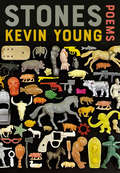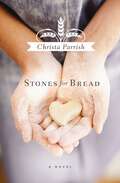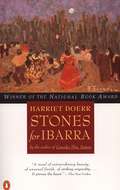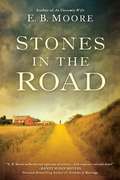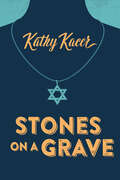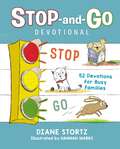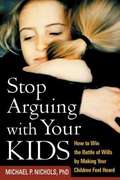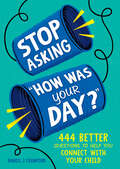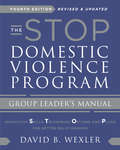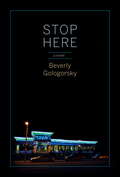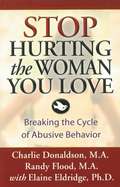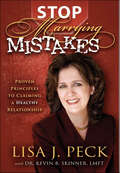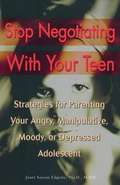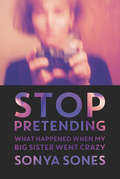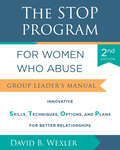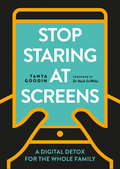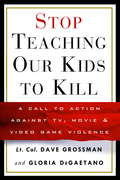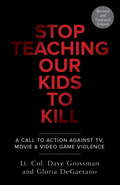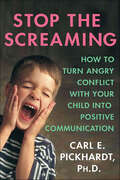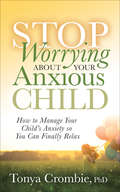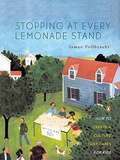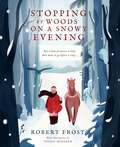- Table View
- List View
Stones: Poems
by Kevin YoungA book of loss, looking back, and what binds us to life, by a towering poetic talent, called "one of the poetry stars of his generation" (Los Angeles Times)."We sleep long, / if not sound," Kevin Young writes early on in this exquisite gathering of poems, "Till the end/ we sing / into the wind." In scenes and settings that circle family and the generations in the American South--one poem, "Kith," exploring that strange bedfellow of "kin"--the speaker and his young son wander among the stones of their ancestors. "Like heat he seeks them, / my son, thirsting / to learn those / he don't know / are his dead." Whether it's the fireflies of a Louisiana summer caught in a mason jar (doomed by their collection), or his grandmother, Mama Annie, who latches the screen door when someone steps out for just a moment, all that makes up our flickering precarious joy, all that we want to protect, is lifted into the light in this moving book. Stones becomes an ode to Young's home places and his dear departed, and to what of them—of us—poetry can save.
Stones for Bread
by Christa ParrishA solitary artisan. A legacy of bread-baking. And one secret that could collapse her entire identity. Liesl McNamara's life can be described in one word: bread. From her earliest memory, her mother and grandmother passed down the mystery of baking and the importance of this deceptively simple food. And now, as the owner of Wild Rise bake house, Liesl spends every day up to her elbows in dough, nourishing and perfecting her craft. But the simple life she has cultivated is becoming quite complicated. Her head baker brings his troubled grandson into the bakeshop as an apprentice. Her waitress submits Liesl's recipes to a popular cable cooking show. And the man who delivers her flour--a single father with strange culinary habits--seems determined to win Liesl's affection. When Wild Rise is featured on television, her quiet existence appears a thing of the past. And then a phone call from a woman claiming to be her half-sister forces Liesl to confront long-hidden secrets in her family's past. With her precious heritage crumbling around her, the baker must make a choice: allow herself to be buried in detachment and remorse, or take a leap of faith into a new life. Filled with both spiritual and literal nourishment, Stones for Bread provides a feast for the senses from award-winning author Christa Parrish. "A quietly beautiful tale about learning how to accept the past and how to let go of the parts that tie you down." --RT Book Reviews, 4.5 stars, TOP PICK!
Stones for Ibarra
by Harriet DoerrWinner of the National Book Award for First Work of Fiction "A very good novel indeed, with echoes of Gabriel Garc#65533;a M#65533;rquez, Katherine Anne Porter, and even Graham Greene. "--The New York Times Richard and Sara Everton, just over and just under forty, have come to the small Mexican village of Ibarra to reopen a copper mine abandoned by Richard's grandfather fifty years before. They have mortgaged, sold, borrowed, left friends and country, to settle in this remote spot; their plan is to live out their lives here, connected to the place and to each other. The two Americans, the only foreigners in Ibarra, live among people who both respect and misunderstand them. And gradually the villagers--at first enigmas to the Evertons--come to teach them much about life and the relentless tide of fate.
Stones In the Road
by E. B. MooreA young Amish boy ventures from Pennsylvania to California in this richly imagined historical novel from the author of An Unseemly Wife.1867. Growing up among the Pennsylvania Amish, eleven-year-old Joshua knows that his father is a respected church deacon who has the ear of God. But he's also seen his father's weakness for drink, and borne the brunt of his violent rages. In the aftermath of a disastrous fire, Joshua fears his father's reprimand enough to run away from home. Having never experienced the ways of the English, Joshua now embarks on a decade-long journey to California, where he's heard it's always summer.His mother, Miriam, is forced to take on the unusual role of head of the family when her husband is unable to recover physically, emotionally, or spiritually from the fire. As mother and son each find themselves in uncharted territory, they must draw on strength and forgiveness from within. Urged by everyone to accept her son's death, Miriam never gives up hope of seeing Joshua again. But even as her prayers are answered so many years later, Joshua's reunion will require him to face his father once again...READERS GUIDE INCLUDED
Stones on a Grave (Secrets #4)
by Kathy KacerJune 1964, Sara has never been out of the tiny town of Hope, Ontario, where she has been in an orphanage all her life. After a fire destroys the Benevolent Home for Necessitous Girls, clues about her parentage—a medical certificate and a Star of David—lead her to Germany. Despite her fears—she doesn’t speak the language, she knows no one in Germany, and she’s never been on an airplane—Sara arrives in Germany determined to explore her newly discovered Jewish heritage and solve the mystery of her parentage. What she encounters is a country still dealing with the aftermath of the Holocaust. With the help of a handsome, English-speaking German boy, she discovers the sad facts of her mother’s brief existence and faces the horrible truth about her father. Ultimately, the knowledge she gains opens up her world and leads her to a deeper understanding of herself. Part of the Secrets Series—a series of seven linked novels that can be read in any order. The epub edition of this title is fully accessible.
Stop-and-Go Devotional: 52 Devotions for Busy Families
by Diane M. StortzHave intentional quality time with your little ones that&’s fun, educational, and meaningful for your family's faith journey with these short devotions.Written by bestselling author Diane Stortz, this to-the-point, interactive devotional gives bite-size teachings on how to follow God.?Stop-and-Go Devotional?provides short, active devotions based on Bible stories, designed for busy families with preschoolers and primary-grade children.Each devotion consists ofStop and Read—an action-filled Bible story;Think and Talk—an age-appropriate devotional thought with questions and a brief prayer; andGreen Means Go!—an easy and fun follow-up activity, a thought to remember, and a supporting Bible verse.Stop-and-Go Devotional?provides 52 devotions with verses and scriptures from the Old and New Testament;is an excellent gift for a birthday, baptism, or first communion; andis perfect for finding a peaceful quiet time before napping or bedtime.
Stop Arguing with Your Kids
by Michael NicholsFor parents fed up with constant challenges to their authority-but who dread becoming tyrants in their own homes-this book provides a powerful new alternative to "because I said so." Trusted family therapist and author Michael P. Nichols takes on the number-one problem of parents today with the insight and humor that has made his earlier The Lost Art of Listening an enduring bestseller. Presented is a simple, easy-to-follow, yet remarkably effective way to put an end to arguments by refusing to argue back. Instead, the techniques of responsive listening help parents open up better communication in the family; create an atmosphere of respect and cooperation; and take children's feelings into account-without giving in to their demands. Loads of realistic examples help parents defuse whining and defiance and manage common conflicts with preschoolers to teens.
Stop Asking "How Was Your Day?": 444 Better Questions to Help You Connect and Communicate with Your Child
by Daniel J. CrawfordWe've all been there: The kids come home from school tired and distracted, and we try to connect with them by asking the same questions day after day. Well, this book will help you find the right questions to connect with your child today and every day."How was school?" "What did you learn today?" "Did you have fun?" If we are lucky, we might get a little more than "Fine" or "It was good" in return. Maybe we're asking the wrong questions. The good news is that this book will help you find the right questions to connect with your child every day. Stop Asking "How Was Your Day?" is an invaluable tool that can be used again and again. Easy to flip through while waiting in the pickup lane outside school or before sitting down to dinner, this book provides diverse and open-ended questions for parents of schoolchildren of all ages and walks of life. Some questions are fun, some are thoughtful, and some are silly. Ultimately, this book is about communication.As we all know, communication is a two-way street, and Stop Asking "How Was Your Day?" alternates the queries with "Lead by Example" sections that prompt parents to share something from their own experiences to help them connect with their children
The STOP Domestic Violence Program (Fourth Edition): Group Leader's Manual
by David B. WexlerAn update to this best-selling treatment program for domestic violence abusers. The bold interventions from STOP have now been field-tested for more than thirty years among military and civilian populations—and STOP has now treated more than 50,000 domestic violence offenders. David Wexler’s program offers therapists, social workers, and other counselors a new level of sound, psychologically based interventions that reach the very men who often seem so unapproachable in a treatment setting. Treatment providers will find new sessions—based on the latest evidence-supported strategies—on insecure attachment issues, stages of change, groundbreaking results from the Adverse Childhood Experiences (ACE) study, normative male alexithymia, stake in conformity issues, substance abuse issues, and more. This new edition integrates twenty- four field- tested video clips to dramatically illustrate key issues for the group. Presented in a 26- or 52-week psychoeducational format, STOP is packed with updated skills, exercises, videos, handouts, and homework assignments that challenge men to examine themselves and develop new tools to manage their relationship issues.
Stop Here
by Beverly GologorskyAva, Mila, and Rosalyn all work at Murray's Diner in Long Island. They are friends and coworkers struggling to hold together their disordered lives. While Ava privately grieves the loss of her husband in the first Iraq War, Mila struggles to dissuade her seventeen-year-old daughter from enlisting in the second. Rosalyn works as an escort by night until love and illness conspire to disrupt the tenuous balance she'd found and the past she'd kept at a safe distance. The promise of a new relationship with a coworker soon begins to restore Ava's faith in her own ability to feel, and Mila learns through wrenching loss that children must learn from their own mistakes. But ultimately it is love-for one another and for their wayward families-that sustains them through the pain and uncertainty of a world with no easy answers.With tender, unadorned prose and a supremely human sympathy for the triumphs and defeats of everyday life, in this long-awaited second novel Beverly Gologorsky delivers a moving and incisive story about loss, friendship, and healing in the shadow of a seemingly endless war.From the Trade Paperback edition.
Stop Hurting the Woman You Love: Breaking the Cycle of Abusive Behavior
by Randy Flood Elaine Eldridge Charlie DonaldsonA first-ever how-to book to help abusive men change their behavior by changing their thinking.End the cycle of abuse - for good. Authors Charlie Donaldson, Randy Flood and Elaine Eldridge uncover a proven action plan that violent men can use to change their behavior. Filled with insightful questionnaires and actual case histories, the essential how-to book Stop Hurting the Woman You Love, will help end abusive patterns in favor of healthier, happier relationships.
Stop Marrying Mistakes: Proven Principles to Claiming a Healthy Relationship
by Lisa J. PeckAfter a divorce, men and women face crucial issues to recover their self-esteem and rebuild their lives. Peck provides an exceptional guide with clear steps to help readers rebuild, strengthen, and enhance their relationships.
Stop Negotiating with Your Teen: Strategies for Parenting Your Angry, Manipulative, Moody, or Depressed Adolescent
by Janet Sasson EdgetteThe sullen, withdrawn, sarcastic teenager. The defensive, wary, and helpless parent. This book builds a bridge between the two sides—with practical and supportive advice on how to: Contain conflicts before they escalate into violence Break through the teen's verbal intimidation Avoid futile arguments Turn confrontation into communication Stand firm against teen rage Manage teen manipulation Build the teen's self-esteem Talk to teens when no one knows what to say For ever parent who's screamed, what am I going to do with you?, this book finally provides the answer. .
Stop Pretending
by Sonya SonesIt happens just like that, in the blink of an eye. An older sister has a mental breakdown and has to be hospitalized. A younger sister is left behind to cope with a family torn apart by grief and friends who turn their backs on her. But worst of all is the loss of her big sister, her confidante, her best friend, who has gone someplace no one can reach.In the tradition of The Bell Jar, I Never Promised You a Rose Garden, and Lisa, Bright and Dark comes this haunting first book told in poems, and based on the true story of the author's life. 2000 Best Books for Young Adults (ALA) and 2000 Quick Picks for Young Adults (Recomm. Books for Reluctant Young Readers)
The STOP Program for Women Who Abuse: Group Leader's Manual (Second)
by David B. WexlerA comprehensive manual for treating intimate partner violence—now updated and revised. Long disregarded, female domestic violence is rapidly gaining awareness as research proves not only that it exists, but that the frequency of women abusing men is much higher than previously assumed. While certain core elements of intimate partner violence are shared among all offenders, female offenders face unique triggers, personal backgrounds, and relationship dynamics. Now fully updated and revised, The STOP Program for Women Who Abuse is the most innovative and comprehensive manual to address domestic violence treatment specifically for female offenders, with a program targeted to engage women in their own healing process. This second edition includes new sessions on the Five Love Languages, the Stages of Change, and Stake in Conformity, and updates throughout the text reflect an increased emphasis on trauma theory, attachment theory, mindfulness techniques, and gratitudes. Handouts and homework for participants (sold separately) provide structure for recovery in group sessions and at home.
Stop Staring at Screens: A Digital Detox for the Whole Family (Digital Detox)
by Tanya GoodinTechnology was designed to make our lives easier, and yet it's one of the biggest drivers of family rifts and stress. Making healthy and realistic decisions about when and where you really need technology can be tricky but is essential for restoring harmony in your home. Stop Staring at Screens has the answers you need.* Find sanity-saving solutions and practical tips* Follow diagnostic quizzes* Identify key triggers * Address common issues* Learn what works best for you and your family
Stop Staring at Screens: A Digital Detox for the Whole Family
by Tanya GoodinTechnology was designed to make our lives easier, and yet it's one of the biggest drivers of family rifts and stress. Making healthy and realistic decisions about when and where you really need technology can be tricky but is essential for restoring harmony in your home. Stop Staring at Screens has the answers you need.* Find sanity-saving solutions and practical tips* Follow diagnostic quizzes* Identify key triggers * Address common issues* Learn what works best for you and your family
Stop Teaching Our Kids to Kill: A Call to Action Against TV, Movie & Video Game Violence
by Gloria Degaetano Dave GrossmanThere is perhaps no bigger or more important issue in America at present than youth violence. Jonesboro; Paducah; Pearl, Mississippi; Stamps, Arkansas; Conyers, Georgia; and, of course, Littleton, Colorado. We know them all too well, and for all the wrong reasons: kids, some as young as eleven years old, taking up arms and, with deadly, frightening accuracy, murdering anyone in their paths. What is going on? According to the authors of Stop Teaching Our Kids to Kill, there is blame to be laid right at the feet of the makers of violent video games (called "murder trainers" by one expert), the TV networks, and the Hollywood movie studios--the people responsible for the fact that children witness literally thousands of violent images a day. Authors Lt. Col. Dave Grossman and Gloria DeGaetano offer incontrovertible evidence, much of it based on recent major scientific studies and empirical research, that movies, TV, and video games are not just conditioning children to be violent--and unaware of the consequences of that violence--but are teaching the very mechanics of killing. Their book is a much-needed call to action for every parent, teacher, and citizen to help our children and stop the wave of killing and violence gripping America's youth. And, most important, it is a blueprint for us all on how that can be achieved. In Paducah, Kentucky, Michael Carneal, a fourteen-year-old boy who stole a gun from a neighbor's house, brought it to school and fired eight shots at a student prayer group as they were breaking up. Prior to this event, he had never shot a real gun before. Of the eight shots he fired, he had eight hits on eight different kids. Five were head shots, the other three upper torso. The result was three dead, one paralyzed for life. The FBI says that the average, experienced, qualified law enforcement officer, in the average shootout, at an average range of seven yards, hits with less than one bullet in five. How does a child acquire such killing ability? What would lead him to go out and commit such a horrific act?
Stop Teaching Our Kids To Kill, Revised and Updated Edition
by Lt. Col. Dave Grossman Gloria DegaetanoCompletely revised and updated, a much-needed call to action for every parent, teacher, and citizen to help our children and stop the wave of killing and violence gripping America's youth Newtown, Aurora, Virginia Tech, Columbine. Thereis no bigger or more important issue in America than youth violence. Kids, some as young as ten years old, take up arms with the intention to murder. Why is this happening? Lt. Col. Dave Grossman and Gloria DeGaetano believe the root cause is the steady diet of violent entertainment kids see on TV, in movies, and in the video games they play--witnessing hundreds of violent images a day. Offering incontrovertible evidence based on recent scientific studies and research, they posit that this media is not just conditioning children to be violent and see killing as acceptable but teaching them the mechanics of killing as well. Stop Teaching Our Kids to Kill supplies the statistics, interprets the copious research that exists on the subject, and suggests the many ways to make a difference in your home, at school, in your community, in the courts, and in the larger world. In using this book, parents, educators, social-service workers, youth advocates, and anyone interested in the welfare of our children will have a solid foundation for effective action and prevention of future Columbines, Jonesboros, and Newtowns.
Stop the Lecturing Start the Conversation: Increasing Your Children's Emotional Intelligence
by Susan SidsworthThis book provides specific strategies for parents, teachers and caregivers who want to enhance the emotional and intellectual intelligence of children. Parents of toddlers often feel frustrated when they cannot communicate with their children in a positive way. Parents of pre-teens and teenagers often feel that their children are "tuning" them out. Many parents resort to lecturing or shouting in order to try and break through these communication barriers. This book aims to provide parents and educators with strategies for establishing a dialogue with children so that they are truly engaged in conversation and the learning process. Establishing a dialogue with children is crucial for our children's emotional, intellectual and social growth. When we establish dialogue or two -way communications with our children we are also part of the learning equation. We have many lessons to teach our children, but our children also have many lessons to teach us. Unfortunately, many of us are trapped in a monologue style of communication. We are telling our children what they can and can not do, we are explaining the rules, we are setting boundaries and we are often not listening to our children. Perhaps you want to protest at this point and say that you do listen to your children and that you try to patiently answer all of their questions. And children are generally asking many questions of the journalistic interrogation kind - Why? Where? When How? What? The fact that children are asking these questions is an indication of their quest to understand the world and the demands that it is making on them. But simply answering a child's questions - patiently or impatiently - is not a true dialogue. A dialogue occurs when two or more people engage in conversation about a subject or a decision and takes turns asking questions and listening to responses. The ideal Socratic Method involves the asking and answering of questions in order to stimulate critical thinking. The opposite of dialogue is a monologue. One person is speaking and others are supposed to be listening. Since monologues eventually become boring and non-engaging children eventually tune out their parents monologues. Many parents will finally exclaim in frustration "Am I talking to myself?" and resort to shouting or talking in an angry tone of voice to get their children's attention. Dialogue, on the other hand, is an engagement and an exchange between two people. This book will provide specific strategies to parents, teachers and caregivers that are designed to enhance the social, emotional and spiritual growth of children and young people.
Stop the Screaming: How to Turn Angry Conflict with Your Child into Positive Communication
by Carl E. PickhardtParenting expert Carl E. Pickhardt brings his considerable experience to tackling the most pervasive and difficult problems parents face in childrearing. Whereas many books on family conflict focus on the prickly teenage years, Pickhardt takes the long view and treats a broad range of ages--starting from the early toddler years all the way through college. He empowers parents to turn conflict into an opportunity to engage with their children on a deeper level. Readers will learn to:- Manage emotion during a fight so that you can hear the feelings behind the vitriol without taking offense. - Give criticism to children in a way that focuses on the behavior and not the person. - Find a hook inside silent tension that will let you connect with your children's feelings and show them a way to empathize with yours.- Consider your children's point of view during a disagreement and teach them to voice their grievances with respect. With a distinctive emphasis on how to distinguish types of conflict dependent on age and gender, Pickhardt shows parents how to turn the daily battles into opportunities for growth. This is a practical guide that helps parents confront difficult issues with which all families grapple.
Stop the World I Want to Get Off: A guide to understanding and supporting the recovery of autistic burnout in children and young people
by Jodie ClarkeWith mental health crisis in autistic young people on the rise we need to accept that Living as an autistic person in a world that doesn't cater to your needs is exhausting at best and harmful at worst.Autistic burnout is a common experience for autistic children and young people. This book, authored by a neurodivergent practitioner with firsthand experience as both an autism parent and researcher, delves into the recognition and management of burnout. It offers parents and professionals practical strategies to prevent autistic burnout and provides guidance on supporting those already in distress.For every child that has been forced into school in pyjamas, for every parent blamed for their child's non-attendance, for every professional who wants to learn more and for every young person traumatized by those who thought they knew best-this book is for you.
Stop Worrying About Your Anxious Child: How to Manage Your Child's Anxiety so You Can Finally Relax
by Tonya CrombieA life coach guides parents through techniques that help you easily manage your child’s anxiety.Are you afraid your child’s anxiety may be more of an issue than you thought? Are you doing everything you can think of to help your anxious child but still feel like you’re failing? Does it feel as if everyone else is so busy judging and giving advice that they can’t love your child just the way your child is? Are you afraid your child won’t have a best friend or even a close group of friends? Do you simply hope your child will learn to cope with anxiety and have a happy, successful life?You can stop worrying!In Stop Worrying About Your Anxious Child, you learn how to manage your child’s anxiety so you can relax, enjoy parenthood, and begin to trust in your child’s bright future again.Dr. Tonya Crombie teaches the techniques that she uses to help herself and parents just like you, including how to:Deal with judgment from well-meaning friends and othersSift through all of the advice and determine what will work for your childStay calm even when the stress is especially toughCreate a support system that supports you and your childYour child deserves a bright future—learn how to start managing your child’s anxiety today!
Stopping at Every Lemonade Stand
by James VollbrachtChildren's lives today are complex, stressful, and dangerous. Kids are overscheduled, come home to empty houses and neighborhoods where they don't know a soul, and in school, face violence-all too often from their peers. In Stopping at Every Lemonade Stand, James Vollbracht provides a blueprint for transforming our unstable and disconnected culture into a healthier, supportive one. Vollbracht bases his approach on six overlapping circles of community-our personal circle, families, neighborhoods, larger communities, business worlds, and elders-and outlines simple actions within each circle that will help rescue our kids. Through a rich blend of heartwarming anecdotes and creative, practical strategies, Stopping at Every Lemonade Stand affirms the age-old wisdom that the power and responsibility to heal our communities rest in our own hands.
Stopping By Woods on a Snowy Evening
by Robert FrostAn illustrated interpretation of Robert Frost&’s classic poem of loss, family bonds, and promises to keep.
